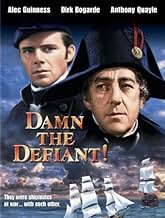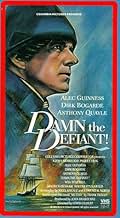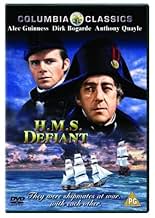On the H.M.S. Defiant, during the French Revolutionary War, fair Captain Crawford is locked in a battle of wills against his cruel second-in-command Lieutenant Scott-Padget, whose heavy-hand... Read allOn the H.M.S. Defiant, during the French Revolutionary War, fair Captain Crawford is locked in a battle of wills against his cruel second-in-command Lieutenant Scott-Padget, whose heavy-handed command style pushes the crew to mutiny.On the H.M.S. Defiant, during the French Revolutionary War, fair Captain Crawford is locked in a battle of wills against his cruel second-in-command Lieutenant Scott-Padget, whose heavy-handed command style pushes the crew to mutiny.
- Director
- Writers
- All cast & crew
- Production, box office & more at IMDbPro
Storyline
Did you know
- TriviaSir Alec Guinness and Sir Anthony Quayle made this movie during the two-month break in the shooting of Lawrence of Arabia (1962), when the production moved from Jordan to Spain. Upon finishing this movie, both returned to Lawrence of Arabia (1962).
- GoofsIn the last scene, Sir Alec Guinness orders all larboard (port side) guns to bear on the fire ship. In the next shot, the starboard cannon fire. Ironically, the term "larboard" was changed by the navy into the current term "port" precisely because it was too easy to mistake it for starboard.
- Quotes
Lieut. Scott-Padget: [Scott-Padget turns back to the Captain as he begins to exit] You may have the power of life and death over every man about this ship, sir, but I warn you: if we come through this voyage safely...
Captain Crawford: [Crawford looks up from his work] Yes? If?
Lieut. Scott-Padget: To have followed Admiralty instructions may not be quite be enough.
Captain Crawford: [Crawford smacks his desk, jumps up and approaches Scott-Padget] I will say this to you only once, sir: I will not be bullied or threatened and I intend to be obeyed! Your friends in London mean nothing to me! I assure you that while you serve aboard this ship, they will mean absolutely nothing to you! You can go now.
- Crazy creditsOpening credits prologue: SPITHEAD, ENGLAND 1797
- ConnectionsFeatured in The Nelson Affair (1973)
The mutiny on the Bounty is the one that most people think of whenever they hear the word "mutiny". Otherwise they think of THE CAINE MUTINY. Actually there have been many mutinies. In 1905 a mutiny on the Russian battleship Potemkin occurred at Odessa on the Black Sea. It was immortalized by Serge Eisenstein in his film of the name POTEMKIN.
It surprises many people outside of England that the Bounty was peanuts compared to the Great Mutiny of 1797 at the Nore and Spithead of the entire British fleet (also the 1931 Invergordon Mutiny of the British fleet during the depression, which was a total surprise). The Great Mutiny is supreme because it occurred just when England was facing revolutionary France in the French Revolutionary Wars. A force being planned by Wolfe Tone and the French General Lazare Hoche was to invade Ireland. By sheer chance the French were unable to take advantage of the moment of England's peril to invade.
The 1797 Mutiny at Spithead was actually successful - various gains in pay and food were made by the sailors. Then came the Nore Mutiny, which was led by a seaman of some leadership qualities named Richard Parker. Parker's demands were impossible, and he apparently toyed with leading the fleet to France. Instead the British Admiralty got tough, and crushed the mutiny. Ironically one of the last ships to give up was H.M.S. Director, which was commanded by William Bligh. It was the second mutiny (of three!) that Bligh would face in his career. Parker was tried for mutiny and executed, as were dozens of other sailors.
It would be nice if some enterprising producer would make an accurate film of the 1797 Mutiny - but until that day comes we are left with two films that roughly approximate the story. There is Peter Ustinov's BILLY BUDD, which is set in the period of the Great Mutiny, and this one. BILLY BUDD has much going for it regarding it's source material (Herman Melville's brilliant study of good and evil, and how they are impossible to separate). Then there is DAMN THE DEFIANT / H.M.S. DEFIANT, which tells the story from the point of view of a single vessel and the evils that permeated all the crew from the Captain to the tars.
Alec Guinness is a well meaning but weak leader who is the Captain of Defiant, and has been stuck with Dirk Bogarde as his new second in command, a socially well-connected sadist. Bogarde is determined to be the real commander of the ship, and is willing to do what is needed to bring Guinness and everyone in sight under heal. Guinness's son is a midshipman on the DEFIANT, and Bogarde keeps finding ways of punishing the young man that Guinness (because of fears of favoritism) will not interfere with. On top of this, during one battle, Guinness loses an arm (a salute to Lord Nelson who was similarly was crippled).
However, the men led by Anthony Quayle, decide to join the mutiny. And then it is Bogarde's turn to sweat.
What were the gripes of the mutineers? Low pay (the government spent money on bribes for votes, but not decent pay). Nothing like pensions for the men - frequently kidnapped by press gangs in the major cities - and left cripples after serving in the naval battles. Food was crap - the quartermasters and the people who sold supplies were in cahoots and sold rotten food to the ships. It was a "lovely life". The wonder is that there weren't more bloodbath mutinies. One (in 1798) on board H.M.S. Hermoine led to the murder of a dozen officers, including the Captain (one Hugh Pigott). Reading of it makes one realize how lucky Bligh and the Admirals were that they did not face the real wrath that was just under the surface.
- theowinthrop
- Sep 25, 2005
- Permalink
- How long is Damn the Defiant!?Powered by Alexa
Details
- Runtime1 hour 41 minutes
- Aspect ratio
- 2.35 : 1
Contribute to this page



































